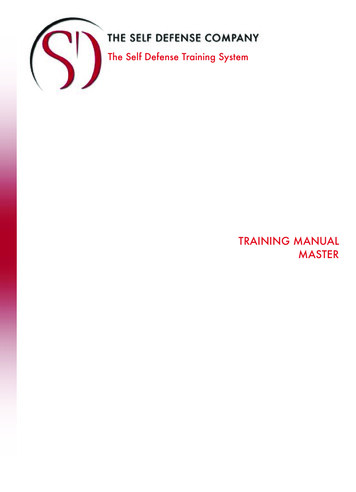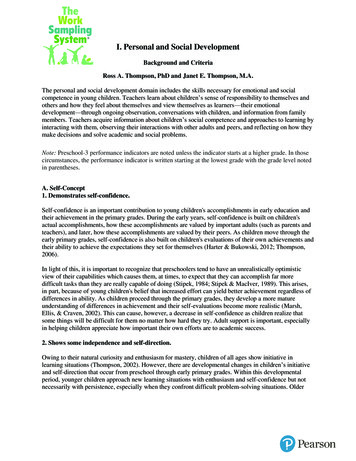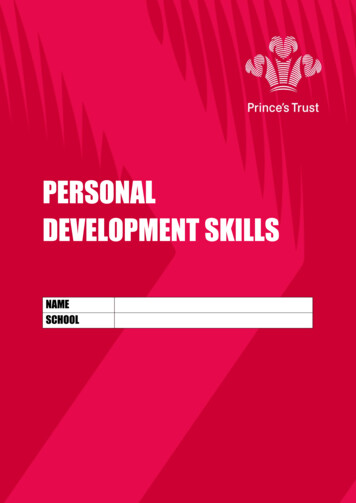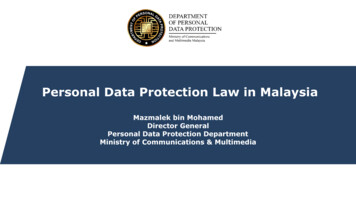
Transcription
"Changing yourself changes everything"Personal DevelopmentCoursesProfessional Development Training has a specialised division of PersonalDevelopment experts that will tailor the delivery of any of the courses to bespecific to your situation and learning needs
Personal Development CoursesActive Listening Training-The secret ofgreat communicators!Anger ManagementWorkshopAssertiveness and SelfConfidence TrainingCommunication Skills Training CourseCreative Problem SolvingTrainingPublic Speaking TrainingStress Management CourseEmotional Intelligence (EQ)Body Language TrainingDealing With Difficult People in theWorkplaceWork-Life Balance TrainingOrganisational Skills TrainingGoal Setting and Getting Things DoneTrainingInfluence and Persuasion atWork Training
Improve Yourself As A Professional And AsAn IndivdualProfessional Development Training has a specialised division of Personal Development expertsthat will tailor the delivery of any of the courses to be specific to your situation and learningneeds.Our extensive curriculum in Personal Development, outstanding depth of trainers across thecountry and diverse range of industry experience means that pd training is the best choice forPersonal Development courses.pd training will exceed your expectations and help you achieve the results you are seeking.
Active listening is the key to effective communication.In this Active Listening training course you will learn how to listen, understand and then respond. Using these techniquesyou will become a more effective communicator in all situations.Pd training's active listening training course is available now in Brisbane, Sydney, Melbourne, Adelaide, Canberra,Parramatta and Perth.Active Listening Training-The secret of great communicators! Course OutlineForeword:Effective listening is actively absorbing the information given to you by a speaker, showing that you are listening andinterested and providing feedback to the speaker so that he or she knows the message was received.This fun and interactive Active Listening Skills Training Program will provide practical skills and knowledge that youwill transform your personal and professional interactions and lead to more rewarding and meaningful communication.Outcomes:In this course participants will:Engage more effectively through actively listeningUnderstand the difference between ‘hearing’ and ‘listening’Learn the techniques to listen activelyIncrease their awareness of communication behavioursUnderstand how emotions effect their ability to listenLearn to paraphrase and restate for clarificationBe able to manage and encourage constructive collaboration
Active Listening Training Course - Lesson 1How Well do you Actively Listen?Let's test your active listening abilityWhy are you not listening to me?Our inner voice-over ruleActive Listening Training Course - Lesson 2What affects Listening?The role of the speakerThe role of the listenerReading non-verbal communicationUsing questioning skillsFeedbackActive Listening Training Course - Lesson 3Active Listening Training Course - Lesson 4Determine your Communication BehavioursHigh Emotion - Low IntelligenceEstablish your behavioural style in different situationsSo what does it mean when I become emotional?Do you give up or bulldoze through?How does it affect my listening skills?But isn't your way right?How does it affect the listening skills of others?Active Listening Training Course - Lesson 5Steps to Improve your Active ListeningLearn to live in the momentLearn to like/love/gain respectListening is also interpretingActive Listening Training Course - Lesson 6Tips and Tricks to Manage a Brainstorming EnvironmentStay in controlGenerate better ideas through collaboration
Anger is a normal, healthy emotion but can quickly become unhealthy and detrimental if not understood and controlled.Mange your anger, reduce your stress and improve your personal and work relationships with this Anger Managementcourse from pd training.Many people take this course to show they are 'working on things' for courts and their workplaces. While we are notaware of a magistrate not accepting this course, each magistrate will make their own judgement based on each individualsituation.We will welcome you to an Anger Management training course in Brisbane, Sydney, Parramatta, Melbourne, Canberra,Adelaide or Perth.Anger Management Workshop Course OutlineForeword:Benjamin Franklin once said, "In this world nothing can be said to be certain, except death and taxes." We would add athird item to his list: anger. Anger can be an incredibly damaging force, costing people their jobs, personal relationships,and even their lives when it gets out of hand. However, since everyone experiences anger, it is important to haveconstructive approaches to manage it effectively.This Anger Management Training program will help teach participants how to identify their anger triggers and what to dowhen they get angry.Outcomes:In this course participants will:Gain a better understanding of anger and the natural anger cycleGain insight into the "fight or flight" response that triggers angerUnderstand the realities of angerLearn about helpful and unhelpful ways of dealing with angerMaster strategies for gaining control of anger in all situationsDiscover some productive ways of "blowing off steam"Learn how to improve home and work life by managing anger betterThis Anger Management Training Course has been Officially Endorsed by the Australian Counselling Association
Anger Management Training Course - Lesson 1Understanding AngerThe cycle of angerUnderstanding fight or flightCommon myths about angerAnger Management Training Course - Lesson 2Do's and Don'tsUnhelpful ways of dealing with angerHelpful ways of dealing with angerAnger Management Training Course - Lesson 3Gaining ControlA word of warningUsing coping thoughtsUsing relaxation techniquesBlowing off some steamAnger Management Training Course - Lesson 4Separate the People from the ProblemObjective vs. subjective languageIdentifying the problemUsing "I" statementsAnger Management Training Course - Lesson 5Working on the ProblemUsing constructive disagreementNegotiating tipsBuilding consensusIdentifying solutionsAnger Management Training Course - Lesson 6Solving the ProblemChoosing a solutionMaking a planGetting it doneAnger Management Training Course - Lesson 7Personal PlanUnderstanding hot buttonsIdentifying your hot buttonsA personal anger logAnger Management Training Course - Lesson 8The Triple A ApproachAlterAvoidAcceptAnger Management Training Course - Lesson 9Dealing with Angry PeopleUnderstanding the energy curveDe-Escalation techniquesWhen to back away and what to do nextAnger Management Training Course - Lesson 10Pulling it All TogetherProcess overviewPutting it into action
This Assertiveness and Self-Confidence Training Course empowers people with the confidence to be 'heard'. In thistraining course, you will learn techniques to communicate in a polite and assertive way, without feeling or appearingpushy.People tell us that this course has changed their lives.Join an Assertiveness and Self-Confidence Training Course, or have a trainer come to your workplace in Brisbane,Sydney, Parramatta, Melbourne, Canberra, Adelaide and Perth.Assertiveness and Self Confidence Training Course OutlineForeword:Assertiveness and Self-Confidence are two skills that are crucial for success in life. If you don't feel worthy and/or youdon't know how to express your self-worth when communicating with others, life can be very unfulfilling.In this Assertiveness and Self-Confidence Training Course, people learn how to become more willing and able tocommunicate, share their opinions and get more proactive in shaping their life and interactions with others.Whether it is learning how to say ‘I believe’, telling yourself ‘it’s ok to give it a go’ or getting better at saying ‘No’, thiscourse will empower you and help you in many aspects of your life.Outcomes:In this course participants will:Understand what it means to be assertive and self-confidentLearn that it's okay to speak up and to stand up for what they believeGain techniques to confidently express opinions and needsLearn to say 'no' without being rude or seeming disinterestedRecognise that you are important and that your opinions are valid and worthy of considerationLearn to identify and eliminate negative thinking and self-talkBecome a more effective communicatorLearn to set achievable goals in-line with personal valuesDiscover how to "feel the part", "look the part", "sound the part" and "become the part"Be able to recognise and deal with difficult behaviours in other people
Assertiveness & Self Confidence Training Course Lesson 1What does Self-Confidence mean to you?What is assertiveness?What is self-confidence?The four stylesAssertiveness & Self Confidence Training Course - Lesson2Obstacles to our Goals?Types of negative thinkingCase studyPersonal applicationAssertiveness & Self Confidence Training Course Lesson 3Communication SkillsAssertiveness & Self Confidence Training Course - Lesson4The Importance of Goal SettingWhy goal setting is importantSetting SMART goalsOur challenge to youListening and Hearing: They aren't the same thingAsking questionsBody languageAssertiveness & Self Confidence Training Course Lesson 5Feeling the PartIdentifying your worthCreating positive self talkIdentifying and addressing strengths and weaknessesAssertiveness & Self Confidence Training Course - Lesson6Looking the PartThe Importance of appearanceThe role of body languageFirst impressions countAssertiveness & Self Confidence Training Course Lesson 7Sounding the PartIt's how you say itSounding confidentUsing "I" messagesAssertiveness & Self Confidence Training Course - Lesson8Powerful PresentationsWhat to do when you're on the spotUsing STAR to make your caseAssertiveness & Self Confidence Training Course Lesson 9Coping TechniquesBuilding rapportExpressing disagreementComing to consensusAssertiveness & Self Confidence Training Course - Lesson10Dealing with Difficult BehaviourDealing with difficult situationsKey tactics
The ability to communicate effectively can have a profound effect on your personal and professional life.This communication skills training course provides you with practical, effective tools to enable clear and effectivecommunication in all situations.This engaging and highly practical training course is available now throughout Australia, including Brisbane, Sydney,Melbourne, Adelaide, Canberra, Parramatta and Perth.Communication Skills Training Course Course OutlineForeword:This communications training course helps people communicate appropriately and clearly in all situations. This is a greatcourse for everyone as the benefits can have a positive effect on every aspect of life. Learn to understand how youcommunicate, how others communicate and how to adjust to meet their needs. Discover how effective communication isgreatly improved by understanding communication preferences and overcoming communication barriers.This interpersonal communication course will ensure your colleagues receive your message clearly and improve yourworkplace relationships in general. If you have never completed a communications course of this type you are missingout on understanding fundamental concepts that will have a profound effect on your life and success in the workplace.Outcomes:In this course, participants will:Gain insight into their personality type and communication preferences, using our proprietary profiling toolLearn to recognise other people's personality types and communication preferencesLearn to adjust your own communication approach based on need and situationUnderstand barriers to effective communication and how to overcome themLearn how to effectively utilise toneMaster the S.T.A.R. method for speaking on the spotLearn to use body language appropriatelyLearn to listen actively and effectivelyGain insight into asking open questionsBecome a more effective communicator through the use and application of practical tools
Communication Skills Training Course - Lesson 1Getting to know yourself - CHOIceWhat is your personality type?What are your communication preferences?What are your communication tendencies?Communication Skills Training Course - Lesson 2Understanding others - CHOIceWhat other personality types are out there?What are their communication preferences?What are their communication tendencies?Communication Skills Training Course - Lesson 3Communication Skills Training Course - Lesson 4Making allowance for others CHOIce and circumstance Understanding Communication BarriersConsider your approach:An Overview of Common BarriersWhat is the receiver's CHOIce?Language BarriersWhat type of message are you delivering?Cultural BarriersIs sensitivity, personal touch, speed,Differences in Time and Placeevidence, privacy or publicacknowledgement most important?Develop strategies for future applicationCommunication Skills Training Course - Lesson 5Paraverbal Communication SkillsThe Power of PitchThe Truth about ToneThe Strength of SpeedCommunication Skills Training Course - Lesson 6Non-Verbal CommunicationUnderstanding the Mehrabian StudyAll About Body LanguageInterpreting GesturesCommunication Skills Training Course - Lesson 7Speaking Like a S.T.A.R.S SituationT TaskA ActionR ResultSummaryCommunication Skills Training Course - Lesson 8Active Listening SkillsSeven Ways to Listen Better TodayUnderstanding Active ListeningSending Good Signals to OthersCommunication Skills Training Course - Lesson 9Asking Good QuestionsOpen QuestionsClosed QuestionsProbing QuestionsCommunication Skills Training Course - Lesson 10Appreciative InquiryThe Purpose of AIThe Four StagesExamples and Case StudiesCommunication Skills Training Course - Lesson 11Mastering the Art of ConversationLevel One: Discussing General TopicsLevel Two: Sharing Ideas and PerspectivesLevel Three: Sharing Personal ExperiencesOur Top Networking TipsCommunication Skills Training Course - Lesson 12Conversational PsychologyUnderstanding Precipitating FactorsEstablishing Common GroundUsing “I” Messages
"Learn to become part of the solution."This Creative Problem Solving training course will provide participants with a complete and practical understanding of thesteps involved to analyse, discover and solve problems in the workplace.Join a Creative Problem Solving training class today, or have a trainer come to your workplace in Brisbane, Sydney,Parramatta, Melbourne, Canberra, Adelaide or Perth.Creative Problem Solving Training Course OutlineForeword:In the past few decades, psychologists and business people alike have discovered that successful problem solvers tendto use the same type of process to identify and implement the solutions to their problems. This process works for anykind of problem, large or small.This Creative Problem Solving workshop will give participants an overview of the entire creative problem solving process,as well as key problem solving tools that they can use every day.Outcomes:In this course participants will:Understand the complete process of creatively solving a problem.Learn some key questions to ask when gathering information about a problemTake home tools to effectively determine what 'the problem is'Learn to write concrete problem statementsDiscover idea-generating tools like affinity diagrams, word chaining, the box method, the six thinking hats & the blinkmethodLearn to evaluate potential solutions against specific criteria like a cost/benefit analysis or group votingLearn to perform a final problem analysis and then select a solutionUnderstand the why's & how's of refining & re-refining a solution shortlistLearn how to identify the tasks & resources necessary to implement a solutionUnderstand how to evaluate & adapt solutions to reality
Creative Problem Solving Training Course - Lesson 1The Problem-Solving MethodIntroduction to Six-Step ProcessProblem DefinitionInformation GatheringGenerating Possible SolutionsAnalysing the SolutionsSelecting the Best Solution(s)Planning the Next Course of ActionCreative Problem Solving Training Course - Lesson 2Problem DefinitionIdentifying the ProblemPAG vs. PAUDetermining the ScopeWriting the Problem StatementCreative Problem Solving Training Course - Lesson 3Information GatheringUnderstanding Types of InformationIdentifying Key QuestionsDeveloping CriteriaCreative Problem Solving Training Course - Lesson 4Brainstorming BasicsCreating a Creative SpaceSetting the Ground RulesGenerating IdeasCreative Problem Solving Training Course - Lesson 6Generating Solutions - Part TwoUsing the Box MethodUsing the Six Thinking HatsUsing the Blink MethodCreative Problem Solving Training Course - Lesson 5Generating Solutions - Part OneLogistical SolutionsUsing Affinity DiagramsWord ChainingCreative Problem Solving Training Course - Lesson 7Evaluating SolutionsDeveloping CriteriaUsing Cost/Benefit AnalysisGroup VotingCreative Problem Solving Training Course - Lesson 8Selecting a SolutionDoing a Final AnalysisFacts vs. IntuitionRefining and Re-Refining the ShortlistCreative Problem Solving Training Course - Lesson 9Planning your Next StepsIdentifying TasksIdentifying ResourcesEvaluating and AdaptingCreative Problem Solving Training Course - Lesson 10Recording Lessons LearnedPlanning the Follow-up MeetingsCelebrating SuccessesIdentifying Improvements
This Public Speaking course will help to overcome nervousness, boost confidence, and increase professionalism byteaching practical tools and techniques that can be utilised straight away. It will provide you with valuable public speakingskills, including in-depth information on developing an engaging program and delivering your presentation withconfidence and power.This engaging, practical training course from pd training is available now in Brisbane, Parramatta, Sydney, Melbourne,Adelaide, Canberra and Perth.Public Speaking Training Course OutlineForeword:Public Speaking consistently ranks as people's top fear (the number 2 fear is normally death, followed by spiders).Additionally, an astounding 75% of people suffer from speech anxiety. Do you want to change your fear of publicspeaking, improve your career, speak with confidence and deliver professional business presentations with impact andease? Mastering this fear and getting comfortable speaking in public can be a great ego booster, not to mention a hugebenefit to your career.Whether you are speaking to a handful of people, a small group, or a large audience, this course will cover the detailsrequired so that you have a dynamic presence for any speaking engagement.Outcomes:By the end of this course, participants will be able to:Analyse an audience and tailor the delivery accordinglyDesign presentations for maximum impactExpand on key points to ensure clarityMaster techniques to overcome nervousness and present with confidencePractice techniques that ensure clear, concise and effective wording is usedDeliver a polished, professional and credible speechHandle questions and comments effectively
Public Speaking Training Course - Lesson 1Identifying your AudiencePerforming a needs analysisCreating an audience profileIdentifying key questions and concernsPublic Speaking Training Course - Lesson 2Creating a Basic OutlineOutlining the situationIdentifying the task that had to be performedListing the actions you tookRevealing the resultsPublic Speaking Training Course - Lesson 3Organising the ProgramMaking organisation easyOrganisational methodsClassifying and categorisingPublic Speaking Training Course - Lesson 4Fleshing it OutIdentifying appropriate sourcesEstablishing credibilityThe importance of citationsPublic Speaking Training Course - Lesson 5Putting it all TogetherWriting your presentationAdding a Plan BReviewing, editing and Re-writingPublic Speaking Training Course - Lesson 6Being PreparedChecking out the venueGathering materialsA 24 Hour checklistPublic Speaking Training Course - Lesson 7Overcoming NervousnessA word from the bossPreparing mentallyPhysical relaxation techniquesAppearing confident in front of the crowdPublic Speaking Training Course - Lesson 8Delivering your Speech - Part OneStarting off on the right footUsing visual aidsChecking the volume of your voicePublic Speaking Training Course - Lesson 9Delivering your Speech - Part TwoAdjusting on the FlyGauging whether breaks are RequiredWrapping up and Winding DownPublic Speaking Training Course - Lesson 10Questions and AnswersGround rulesAnswering questions that sound like an attackDealing with complex questions
Stress statistics for Australians are on the rise. Global disasters, economic hardships, work, relationships, all combine toincrease anxiety that manifests itself in heart disease, lost work hours and even death.These Stress Management workshops from pdtraining will teach how to manage stress, how to maximise positive stress,how to use routines, relaxation techniques and much more.This dynamic training course is available now throughout Australia including, Brisbane, Sydney, Melbourne, Adelaide,Canberra and Perth.Stress Management Course Course OutlineForeword:Positive and negative stress is a constant influence on all of our lives. The trick is to maximize the positive stress and tominimize the negative stress. This workshop will give participants a three-option method for addressing any stressfulsituation, as well as a toolbox of personal skills, including using routines, relaxation techniques, and a stress log system.Outcomes:Master the three "A's" of a stressful situation: Alter, Avoid, AcceptLearn what lifestyle elements can be changed to reduce stressUse routines to reduce stressLearn environmental & physical relaxation techniquesLearn how to cope with major eventsLearn how to use a stress log to identify stressors & create a plan to reduce or eliminate them
Stress Management Training Course - Lesson 1Understanding StressWhat is Stress?What is Eustress?Understanding the 'Triple A' approachStress Management Training Course - Lesson 2Creating a Stress-Reducing LifestyleEating properlyExercising regularlySleeping wellStress Management Training Course - Lesson 3Altering the SituationThe First 'A'Identifying appropriate situationsCreating effective actionsStress Management Training Course - Lesson 4Avoiding the SituationThe Second 'A'Identifying appropriate situationsCreating effective actionsStress Management Training Course - Lesson 5Accepting the SituationThe Third 'A'Identifying appropriate situationsCreating effective actionsStress Management Training Course - Lesson 6Using Routines to Reduce StressPlanning mealsOrganising choresUsing a To-Do listStress Management Training Course - Lesson 7Environmental Relaxation TechniquesFinding a sanctuaryUsing musicSeeing the humourStress Management Training Course - Lesson 8Physical Relaxation TechniquesSoothing stretchesDeep breathingTensing and relaxingMedicationStress Management Training Course - Lesson 9Coping with Major EventsEstablishing a support systemCreating a planKnowing when to seek helpStress Management Training Course - Lesson 10Our Challenge to YouCreating a stress logWeek One: recording eventsWeek Two: identifying stressors and creating a planWeek Three: creating new habitsReviewing and evaluating
Emotions can influence the way we act and react in the workplace. Emotional Intelligence is the ability to recognise ourbehaviours, moods, and impulses, and manage them in a positive way so that we can communicate effectively,empathise with others, manage stress, overcome challenging situations and defuse conflict.Emotional intelligence helps you build stronger relationships, succeed at work, and achieve your career and personalgoals.This dynamic training course is available now throughout Australia, including Brisbane, Sydney, Melbourne, Adelaide,Canberra and Perth.Emotional Intelligence (EQ) Course OutlineForeword:Healthy emotions Clear thinking Appropriate action High EQEmotional intelligence is a skill. And like any other skill, you can get better at it with training and practice. It allows you toread the style of individuals and adjust your communications accordingly.This one day training course is useful for anyone who leads or works with other people, no matter what size theorganisation. This course will focus on the five core competencies of emotional intelligence: self-management, selfawareness, self-regulation, self-motivation and empathy and also include interpersonal skills.Participants will learn to develop and implement these competencies to enhance their relationships in work and life byincreasing their understanding of social and emotional behaviours, and learning how to adapt and manage theirresponses to particular situations.Outcomes:Define Emotional Intelligence (EQ).Identify the benefits of emotional intelligence.Learn the four core skills required to practice emotional intelligence.Define and practice self-management, self-awareness, self-regulation, self-motivation and empathy.Successfully communicate with others in a non-verbal manner.Verbally communicate with others.Interpret and manage your emotions.Master tools to regulate and gain control of one’s own emotionsArticulate your emotions using the right language.Balance optimism and pessimism.Effectively impact others.Relate emotional intelligence to the workplace.Use the concepts and techniques in the workplace.
Emotional Intelligence (EQ) For Professionals TrainingCourse - Lesson 1Getting StartedHousekeeping ItemsWorkshop ObjectivesThe Parking LotAction PlanEmotional Intelligence (EQ) For Professionals TrainingCourse - Lesson 2What is Emotional Intelligence?Benefits of Emotional IntelligenceSnapshot of Academic Theory of EI & Assessing EQ5 Dimensions of the Trait EI ModelLesson 2 Workbook Activity: EQ Self-AssessmentEmotional Intelligence (EQ) For Professionals TrainingCourse - Lesson 3Self-Awareness (SA)Self-AwarenessSelf-ManagementSeeing the Other SideGiving in Without Giving Up – The Art of CompromiseLife Positions – You and Only You Can Choose YourMindsetLesson 3 Workbook ActivitiesEmotional Intelligence (EQ) For Professionals TrainingCourse - Lesson 4Self-Regulation/Managing Emotions (ME)The ‘EQ brain’ and How it WorksThe Science of EmotionsAmygdala Hijack - What’s Happening Inside Our HeadWhen We Lose ControlUnderstanding EmotionsFind Your Self-Control Take Back Your AmygdalaUsing Coping ThoughtsRelaxation TechniquesLesson 4 Workbook ActivitiesEmotional Intelligence (EQ) For Professionals TrainingCourse - Lesson 5Self-Motivation (M)OptimismPessimismThe Balance between Optimism and PessimismThe Power of Re-Framing: The Balance betweenOptimism and PessimismLesson 5 Workbook ActivityEmotional Intelligence (EQ) For Professionals TrainingCourse - Lesson 6Empathy (E)What are the Barriers to Empathy?Developing Your EmpathyLesson 6 Workbook ActivityEmotional Intelligence (EQ) For Professionals TrainingCourse - Lesson 7Social Skills (SS)Making an ImpactCreating a Powerful First ImpressionAssessing a SituationBeing Zealous without Being OffensiveTraits of a Person with High Social SkillsEmotional Intelligence (EQ) For Professionals TrainingCourse - Lesson 8Skills in Emotional IntelligenceHow to Accurately Perceive EmotionsUse Emotions to Facilitate ThinkingUnderstand Emotional MeaningsManage EmotionsLesson 8 Workbook ActivityEmotional Intelligence (EQ) For Professionals TrainingCourse - Lesson 9Verbal Communication SkillsVerbal Communication – Clear Message, EmotionallyEffectiveFocused ListeningAsking QuestionsCommunicating with Flexibility and AuthenticityEmotional Intelligence (EQ) For Professionals TrainingCourse - Lesson 10Non-Verbal Communication SkillsBody LanguageThe Signals You Send to OthersIt’s Not What You Say, It’s How You Say ItEmotional Intelligence (EQ) For Professionals TrainingCourse - Lesson 11Social Management and ResponsibilityArticulate your Emotions Using LanguageBusiness PracticesUnderstand Emotions and How to Manage Them inthe WorkplaceRole of Emotional Intelligence at WorkDisagreeing ConstructivelyEmotional Intelligence (EQ) For Professionals TrainingCourse - Lesson 12Wrapping UpWords from the WiseReview of Parking LotLessons LearnedCompletion of Action Plans and Evaluations
The ability to interpret body language is a skill that will enhance your capability.This Body Language training course from pd training will enable you to recognise the body language of others whilebeing aware of what your own body is communicating.Body Language training courses are available now throughout Australia, including Brisbane, Sydney, Parramatta,Melbourne, Adelaide, Canberra and Perth.Body Language Training Course OutlineForeword:The ability to interpret body language is a skill that will enhance anyone’s career. Body language is a form ofcommunication, and it needs to be practiced like any other form of communication. Whether in sales or management, it isessential to understand the body language of others and exactly what your own body is communicating.Outcomes:In this course participants will:Learn how to translate genstures into wordsUnderstand the difference between open & closed body languageLearn how to avoid common body language mistakesGain insight into the differences in body language between gendersUnderstand the signals you're sending to othersLearn the role facial expressions play in body languageLearn how to use body language to strengthen your negotiationsUnderstand how body language can expose deceptionLearn how to match words with movement to instill trust
Body Language Training Course - Lesson 1Getting StartedThe Parking LotWorkshop ObjectivesAction Plans & EvaluationsBody Language Training Course - Lesson 2Communicating with Body LanguageLearning a New LanguageThe Power of Body LanguageMore than WordsActions Speak Louder than WordsBody Language Training Course - Lesson 3Reading Body Language
Assertiveness and Self Confidence Training Course Outline Foreword: Assertiveness and Self-Confidence are two skills that are crucial for success in life. If you don't feel worthy and/or you don't know how to express your s











